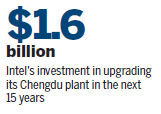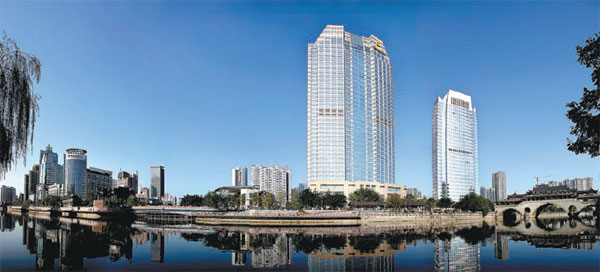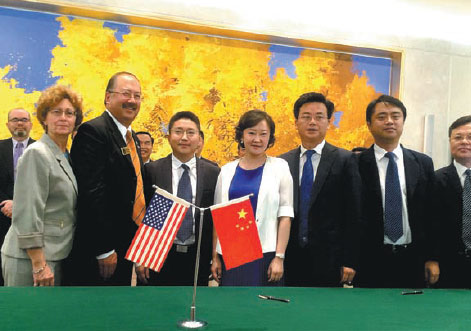Chengdu's investments flow both ways
City attracts foreign investors and projects seeking funding
Chengdu is being increasingly recognized globally as a rising star in both attracting foreign investment and buying into overseas projects.
On July 12, a delegation of nine Silicon Valley mayors and deputy mayors visited the capital of Sichuan province in Southwest China to promote friendship and forge business cooperation.
The delegation signed an international incubator agreement and a cooperation memorandum with government officials from 21 districts and counties in Chengdu.
In the next five years, the two locations plan to work on projects in high-tech and innovation areas, such as commercializing technological achievements and building science parks.
Carol Dutra-Vernaci, mayor of Union City, said the US city has not had any investments from Chengdu, but that situation is about to change.
Dutra-Vernaci made contact with an entrepreneur involved in the biomedical industry during the Chengdu visit. "This is exactly what I am looking for and we will keep in touch," she said.
Robert George Gottschalk, deputy mayor of Millbrae, said the biggest advantage his city has is transportation.
"Millbrae is located close to the San Francisco International Airport and therefore Chengdu entrepreneurs are welcome to invest in hotels, office buildings and dwelling houses there," he said.
Suzanne Lee Chan, deputy mayor of Fremont, said her city is mainly looking for investments from the clean energy industry. Chan also expected to find production and research partners for electric car company Tesla Motors, whose production center is located in Fremont.
Many mayors said preferential tax policies would be provided to Chengdu companies that invest in Silicon Valley.
M. Catherine Carlton, mayor of Menlo Park, said her city would also offer financing services, human resources and office buildings to foreign investors.
Huge potential
The delegation was impressed by the entrepreneurial environment in Chengdu and believed the city would become a second "Silicon Valley".
Carlton said Chengdu was a "hidden diamond", which needed to go through a transformation process under high temperature and pressure to sparkle.
Chan, the deputy mayor of Fremont, said although Chengdu and Silicon Valley have big differences in size and population, the two were similar in entrepreneurial atmosphere and management concept.
On July 24, Diodes Technology (Chengdu) had a ceremony announcing its production plant was ready to go into operation.
Located near the production bases of two global semiconductor giants Intel and Texas Instruments in the Chengdu High-tech Industrial Development Zone, the plant will primarily focus on semiconductor assembly and testing services, with investments of $200 million.
Diodes Technology was founded in 2010 by Diodes Incorporated, a leading global provider of discrete, analog and logic semiconductors, and Chengdu Yaguang Electronics.
Keh-Shew Lu, president and chief executive officer of Diodes, expressed his "great faith" in the investment at the ground-breaking ceremony of Diodes Technology four years ago. At the opening ceremony, he repeated that locating the plant in Chengdu was a "decision with bright prospects".
"The city's excellent industrial development environment and sound related services are what made Diodes decide to invest in the city," Lu said.
The monthly production capacity of Diodes Technology's Chengdu plant is expected to reach 400 million chips in September and 1.2 billion chips by October next year. When the plant is fully equipped, its production output for a month will triple that of the Diodes's Shanghai plant, to reach 9 billion chips.
"At that time, the Chengdu plant will become the largest Chinese production base of Diodes and help it meet the ever-increasing demands of customers from across the world," Lu said.
Moreover, according to the latest strategic plans of Diodes, the Chengdu plant will be developed into the company's largest production base in the world.
Other semiconductor companies will and already have increased their investment in Chengdu. For example, Intel announced an additional investment of $1.6 billion last year to upgrade its Chengdu plant in the next 15 years.
Texas Instruments signed an investment agreement worth $1.7 billion in 2013 during the Chengdu Global Fortune Forum. Its seventh chip assembly and testing plant worldwide was put into operation in the city at the end of last year, and the company plans to set up a 12-inch wafer bumping processing plant.
Lu Haoan, global vice-president and China president of Semiconductor Equipment and Materials International, said the development of the semiconductor industry in Chengdu is "amazing".
"Strategic development vision, policy support and high-quality employees nurtured by good educational resources are key elements for the rapid development of the semiconductor industry, and Chengdu features all of them," Lu said.
Ge Jun, executive director of Intel China, said the rise in electronic information in Chengdu is "changing the layout of the world's information technology".

The city has formed a complete industrial chain from integrated circuit design to wafer manufacturing and IC assembly and testing in the high-tech zone, and one of every two laptops in the world is configured with a chip made in Chengdu.
High-tech zone
The Chengdu High-tech Industrial Development Zone was relatively unknown globally when Intel invested $375 million there several years ago. Now, it is home to outlets and plants of more than 120 Fortune Global 500 companies.
On June 11, the zone was approved to be a State-level innovation demonstration zone, the first of its kind in the western China.
The administrative committee is working on the zone's development plan from 2015 to 2020, and one of the goals is to build it into a world-class high-tech zone, said officials from the administrative committee.
The high-tech zone has become an entrepreneurial landscape for both Chinese and overseas young entrepreneurs to start new businesses.
The Entrepreneurial Tianfu project launched by the city government in February also helped encourage local college students, talented science and technology professionals and overseas Chinese to found startups.
The project aims to encourage venture investors and entrepreneurs to Chengdu.
Bai Yong, who is studying for a doctorate in biomedical engineering at the University of California at Los Angeles, said he has been planning to start a business for a long time and the Chengdu high-tech zone is his preferred destination.
"Although I am staying abroad, I have been keeping an eye on the entrepreneurial environment in Chengdu and plan to start a business at the high-tech zone with my friends at UCLA when we graduate," he said.
haonan@chinadaily.com.cn
|
The picturesque urban landscape adds to Chengdu's appeal to international investors. Photos Provided To China Daily |
|
|
(China Daily 09/28/2015 page15)
















